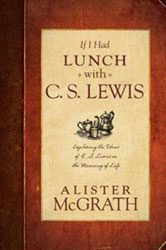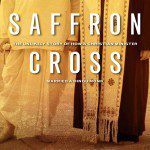 I’ll begin with a confession: I’ve never been able to “get into” C. S. Lewis.
I’ll begin with a confession: I’ve never been able to “get into” C. S. Lewis.
As a child, the Narnia stories never held the magic for me that they did for my friends, and as an adult, despite committing myself to The Space Trilogy, The Screwtape Letters, Mere Christianity, and The Great Divorce, I just couldn’t connect. Where others found Lewis’s writing intimate and enlightening, I found it cool and formal. Being an English professor, writer, and Christian myself, this is really rather strange. C. S. Lewis and I seem to be a natural match. (It’s also a little embarrassing, something akin to being a huge basketball fan who thinks Michael Jordan was “just okay”). Needless to say, I’ve always had the sneaking suspicion that I was missing something important.
So it was with a deep sense of gratitude and renewed excitement that I turned the final page of theologian Alistair McGrath’s new book If I Had Lunch with C. S. Lewis. McGrath offered me a revitalized perspective on Lewis’s work: a big picture approach, one that reveals the larger themes and concerns of Lewis’s opus, highlighting his commitment to developing and examining our culture and the Christian worldview and always asking the tough questions, no matter where they might lead him. The sheer act of presenting Lewis in this way, as a humble man exploring the great quandaries of existence through various genres and styles of writing, a man who—having suffered great loss and trial in his own personal life (the deaths of both his mother and wife; service in the British Army during World War II; and experiencing a crisis of faith in which he rejected atheism for Christianity)—was writing perhaps out of necessity more than any other motive.
The book is divided into eight sections, each exploring Lewis’s thoughts on a different facet of the “meaning of life.” While each chapter offers a wealth of insight on topics as diverse and intriguing as faith, suffering, friendship, and apologetics, as a professional educator myself, the chapter on education struck me as especially powerful. Lewis’s primary work on education is The Abolition of Man. Written during World War II, Lewis was living in the midst of a world where mass destruction and Nazism had taken center stage, and, in wondering how humanity could have come to this point, Lewis pinpointed education as a central factor. He believed that education shapes worldviews and that a teacher’s work should be about far more than instructing students to master skills or preparing them for a job; instead, teachers should lead students to recognize objective truths and to distinguish between right and wrong. He felt that in this way education was failing its pupils: moral relativism was the ideology of the day, and Lewis, a teacher of English literature at Oxford and Cambridge, saw the propagation of this ideology as a challenge to the very functioning of society. This issue is no less relevant today than it was nearly a century ago. If anything, the removal of instruction in values from the classroom has progressed even further, and moral relativism is now firmly entrenched as the ideology of academia leaving Lewis’s advice perhaps even more pressing and relevant today. In particular, McGrath identifies three points Lewis makes regarding the ideal process and purpose of education:
1) Avoid chronological snobbery, or the notion that new ideas are inherently superior because they are new. Lewis encourages students to read old books as a way of revealing that “basic assumptions have been quite different in different periods” and that every age has always thought its own new ideas were the most right. Lewis encourages students as well to hold off on jumping on the latest intellectual, ideological, or cultural bandwagon in preference for applying a critical eye to its merits.
2) Expand your vision. Lewis believed education is a way to help us better understand the world and other people. Reading literature, for example, helps us “to see with other eyes, to imagine with other imaginations, to feel with other hearts” and is a way of “entering fully into the opinions, and therefore also the attitudes, feelings, and total experience” of others. By learning to view the world from different perspectives and inhabit different lives as we read, we can find the perspectives of value and adopt them as our own.
3) Go deeper. In particular for Christians, Lewis found education important for steering clear of what he perceived to be the negative influences of liberalism and modernism on the church. Lewis said we should allow our education to guide us towards what he called “Deep Church,” or church that is simultaneously “rooted in the past and engaged with the present.” We can do this by reading the works of great Christian writers (he suggests, for example, St. Augustine and Thomas Aquinas).
In light of McGrath’s work on Lewis in this volume, it strikes me how really rare the C. S. Lewis’s of the world are. Steeped in the secular culture of academia as I am, I find myself often bogged down by the “small questions”: the concerns of the latest academic publications or cutting edge research, the morning’s news updates or the week’s political drama, the latest dips in the economy and who said what in this or that journal or on this or that blog and how I should respond. But the big questions should hardly be limited to a Sunday-morning-sermon affair, and the refreshing release that comes with discovering an author who values such questions and upholds them as worthy may help us reconsider our approach to life entirely.
I recall a time when I was in elementary and even middle school where I used to lie in bed at night and think about the types of questions Lewis asks: what heaven might be like, why God allows suffering, how to possibly wrap my mind around concepts of eternity or evil or sin. But somewhere along the line, I stopped asking. Somewhere along the line, the things waking me up at night were smaller troubles: did I forget to send out an important email, will I need to get gas before work in the morning, should I go to the gym before or after my morning doctor’s appointment. But the reason these questions ceased to be asked was certainly not because the answers have been made clear; rather, it was because such questions—after a certain point in one’s life—are not often encouraged or at the forefront of cultural concerns. As Lewis makes abundantly clear though, this is a shame. In reality, what questions could possibly be more important?
McGrath has succeeded in If I Had Lunch With C. S. Lewis not primarily because he is able to encompass and clarify an abundance of material in only 229 short pages or because he has organized Lewis’s work and presented it in a way that is comprehensible and clear, but because he directs his readers back to Lewis himself. McGrath’s book is a road sign pointing his readership to the books of Lewis. I’m ready to return to the “L” section of my bookshelves. And this time, I think things are going to work out perfectly.
For more conversation on If I Had Lunch with Lewis, visit the Patheos Book Club here.
 Amber M. Stamper holds a Ph.D. in English (Rhetoric and Composition) and is an Assistant Professor of Language, Literature, and Communication at Elizabeth City State University in North Carolina. Her research and publications center on religious rhetoric and communication, especially issues of Christian evangelism and the digital church.
Amber M. Stamper holds a Ph.D. in English (Rhetoric and Composition) and is an Assistant Professor of Language, Literature, and Communication at Elizabeth City State University in North Carolina. Her research and publications center on religious rhetoric and communication, especially issues of Christian evangelism and the digital church.












